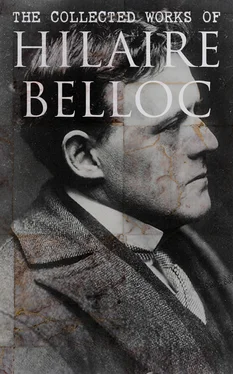Now, just at the very entry to Bolsena, when we had followed the lovely lake some time, my driver halted and began to turn up a lane to a farm or villa; so I, bidding him good-night, crossed a field and stood silent by the lake and watched for a long time the water breaking on a tiny shore, and the pretty miniatures of waves. I stood there till the stars came out and the moon shone fully; then I went towards Bolsena under its high gate which showed in the darkness, and under its castle on the rock. There, in a large room which was not quite an inn, a woman of great age and dignity served me with fried fish from the lake, and the men gathered round me and attempted to tell me of the road to Rome, while I in exchange made out to them as much by gestures as by broken words the crossing of the Alps and the Apennines.
Then, after my meal, one of the men told me I needed sleep; that there were no rooms in that house (as I said, it was not an inn), but that across the way he would show me one he had for hire. I tried to say that my plan was to walk by night. They all assured me he would charge me a reasonable sum. I insisted that the day was too hot for walking. They told me, did these Etruscans, that I need fear no extortion from so honest a man.
Certainly it is not easy to make everybody understand everything, and I had had experience already up in the mountains, days before, of how important it is not to be misunderstood when one is wandering in a foreign country, poor and ill-clad. I therefore accepted the offer, and, what was really very much to my regret, I paid the money he demanded. I even so far fell in with the spirit of the thing as to sleep a certain number of hours (for after all, my sleep that day in the cart had been very broken, and instead of resting throughout the whole of the heat I had taken a meal at Acquapendente). But I woke up not long after midnight--perhaps between one and two o'clock--and went out along the borders of the lake.
The moon had set; I wish I could have seen her hanging at the quarter in the clear sky of that high crater, dipping into the rim of its inland sea. It was perceptibly cold. I went on the road quite slowly, till it began to climb, and when the day broke I found myself in a sunken lane leading up to the town of Montefiascone.
The town lay on its hill in the pale but growing light. A great dome gave it dignity, and a castle overlooked the lake. It was built upon the very edge and lip of the volcano-cup commanding either side.
I climbed up this sunken lane towards it, not knowing what might be beyond, when, at the crest, there shone before me in the sunrise one of those unexpected and united landscapes which are among the glories of Italy. They have changed the very mind in a hundred northern painters, when men travelled hither to Rome to learn their art, and coming in by her mountain roads saw, time and again, the set views of plains like gardens, surrounded by sharp mountain-land and framed.
The road did not pass through the town; the grand though crumbling gate of entry lay up a short straight way to the right, and below, where the road continued down the slope, was a level of some eight miles full of trees diminishing in distance. At its further side an ample mountain, wooded, of gentle flattened outline, but high and majestic, barred the way to Rome. It was yet another of those volcanoes, fruitful after death, which are the mark of Latium: and it held hidden, as did that larger and more confused one on the rim of which I stood, a lake in its silent crater. But that lake, as I was to find, was far smaller than the glittering sea of Bolsena, whose shores now lay behind me.
The distance and the hill that bounded it should in that climate have stood clear in the pure air, but it was yet so early that a thin haze hung over the earth, and the sun had not yet controlled it: it was even chilly. I could not catch the towers of Viterbo, though I knew them to stand at the foot of the far mountain. I went down the road, and in half-an-hour or so was engaged upon the straight line crossing the plain.
I wondered a little how the road would lie with regard to the town, and looked at my map for guidance, but it told me little. It was too general, taking in all central Italy, and even large places were marked only by small circles.
When I approached Viterbo I first saw an astonishing wall, perpendicular to my road, untouched, the bones of the Middle Ages. It stood up straight before one like a range of cliffs, seeming much higher than it should; its hundred feet or so were exaggerated by the severity of its stones and by their sheer fall. For they had no ornament whatever, and few marks of decay, though many of age. Tall towers, exactly square and equally bare of carving or machicolation, stood at intervals along this forbidding defence and flanked its curtain. Then nearer by, one saw that it was not a huge castle, but the wall of a city, for at a corner it went sharp round to contain the town, and through one uneven place I saw houses. Many men were walking in the roads alongside these walls, and there were gates pierced in them whereby the citizens went in and out of the city as bees go in and out of the little opening in a hive.
But my main road to Rome did not go through Viterbo, it ran alongside of the eastern wall, and I debated a little with myself whether I would go in or no. It was out of my way, and I had not entered Montefiascone for that reason. On the other hand, Viterbo was a famous place. It is all very well to neglect Florence and Pisa because they are some miles off the straight way, but Viterbo right under one's hand it is a pity to miss. Then I needed wine and food for the later day in the mountain. Yet, again, it was getting hot. It was past eight, the mist had long ago receded, and I feared delay. So I mused on the white road under the tall towers and dead walls of Viterbo, and ruminated on an unimportant thing. Then curiosity did what reason could not do, and I entered by a gate.
The streets were narrow, tortuous, and alive, all shaded by the great houses, and still full of the cold of the night. The noise of fountains echoed in them, and the high voices of women and the cries of sellers. Every house had in it something fantastic and peculiar; humanity had twined into this place like a natural growth, and the separate thoughts of men, both those that were alive there and those dead before them, had decorated it all. There were courtyards with blinding whites of sunlit walls above, themselves in shadow; and there were many carvings and paintings over doors. I had come into a great living place after the loneliness of the road.
There, in the first wide street I could find, I bought sausage and bread and a great bottle of wine, and then quitting Viterbo, I left it by the same gate and took the road.
For a long while yet I continued under the walls, noting in one place a thing peculiar to the Middle Ages, I mean the apse of a church built right into the wall as the old Cathedral of St Stephen's was in Paris. These, I suppose, enemies respected if they could; for I have noticed also that in castles the chapel is not hidden, but stands out from the wall. So be it. Your fathers and mine were there in the fighting, but we do not know their names, and I trust and hope yours spared the altars as carefully as mine did.
The road began to climb the hill, and though the heat increased--for in Italy long before nine it is glaring noon to us northerners (and that reminds me: your fathers and mine, to whom allusion has been made above {as they say in the dull history books--[LECTOR. How many more interior brackets are we to have? Is this algebra? AUCTOR. You yourself, Lector, are responsible for the worst.]} your fathers and mine coming down into this country to fight, as was their annual custom, must have had a plaguy time of it, when you think that they could not get across the Alps till summer-time, and then had to hack and hew, and thrust and dig, and slash and climb, and charge and puff, and blow and swear, and parry and receive, and aim and dodge, and butt and run for their lives at the end, under an unaccustomed sun. No wonder they saw visions, the dear people! They are dead now, and we do not even know their names.)--Where was I?
Читать дальше












